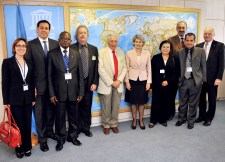The support of governments to their National Commissions for UNESCO is crucial, says the Director-General

- © UNESCO/Ravassard - DG and NatComs Representatives
Ms Irina Bokova, Director-General of UNESCO, received a group of National Commissions officials attending the 185th session of the Executive Board in Paris on 15 October 2010 .
The group included the representatives of seven countries (Brazil, Burkina Faso, Canada, Cuba, Spain, Tunisia and Uzbekistan) and was led by Mr Luis Ramallo, Chair of the Coordinating Group of National Commissions.
In a cordial exchange of views, the Director-General reaffirmed UNESCO’s firm commitment to support and cooperate closely with National Commissions who act as vital bridges linking governments, scientific communities and civil society partners.
Referring to the recent Regional Consultations with National Commissions on the preparation of the Draft 36 C/5, Irina Bokova stated that without the contribution of the National Commissions network, the Organization would hardly elaborate its programmes and attain its objectives.
The Director-General recalled the joint responsibilities of UNESCO and Member States towards the National Commissions, underlining that the support of governments was crucial to enable their Commissions to operate efficiently.
The National Commissions representatives congratulated Ms Bokova for her efforts to promote a culture of peace and a new humanism and thanked for her participation in several Regional Consultations on the Draft 36 C/5. They also requested UNESCO to actively and consistently cooperate with National Commissions in addressing global challenges, by involving National Commissions in various debates and partnership programmes at national, regional and global levels.
“One of the advantages and strengths of the National Commissions is that they represent and liaise with different networks and stakeholders to ensure a moral solidarity with UNESCO”, said
Mr Ramallo in particular. He stressed that the UN “Delivering as One” reform provides a new opportunity for them to play an active role in that process.
This encounter with the Director-General took place right after the Informal Meeting of National Commissions, which was held in UNESCO HQs in the morning of the same day.
- 03-11-2010

